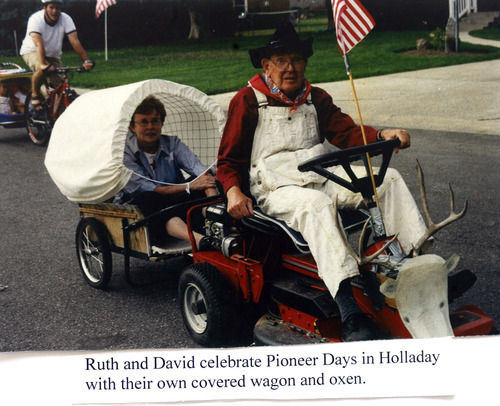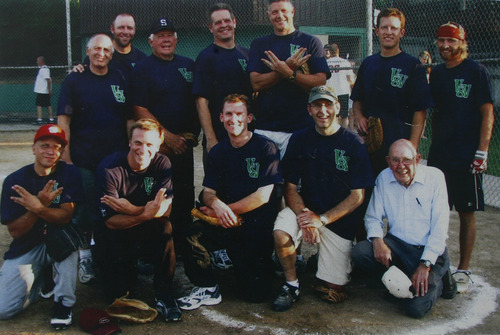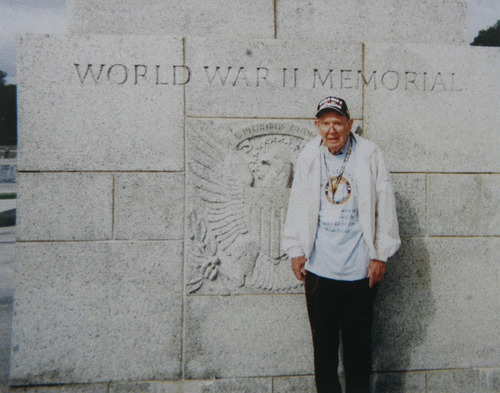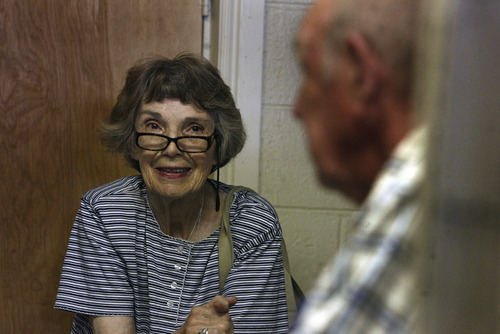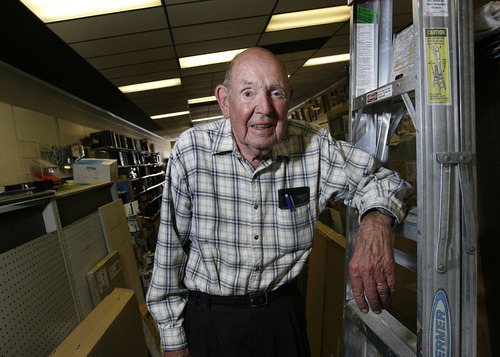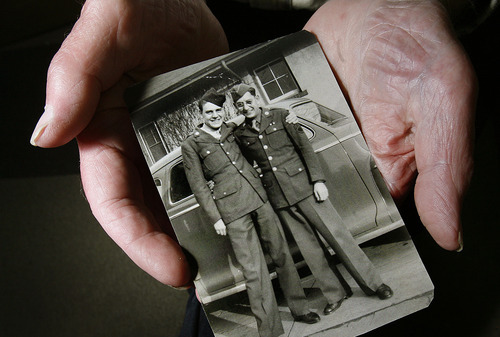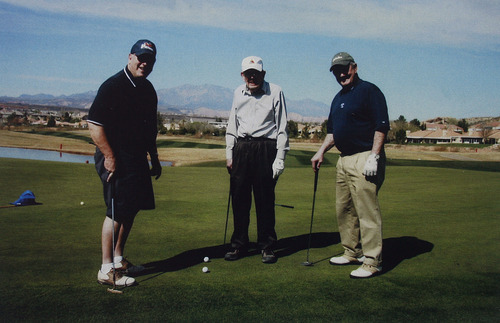This is an archived article that was published on sltrib.com in 2012, and information in the article may be outdated. It is provided only for personal research purposes and may not be reprinted.
To this day, Mark Pace remembers a lesson he learned 44 years ago from his fifth-grade teacher, David Parry.
Pace went to the back of the room for a drink, and when he returned, a classmate pulled the chair out from under him. "I fell and everyone was laughing and laughing and laughing. I was humiliated."
Mr. Parry didn't let it pass, but he didn't flay the prankster. "He taught us we don't treat people that way," says Pace. "He was a teacher far beyond the curriculum."
Parry, now 88, is still teaching, though the World War II veteran has been out of the classroom for more than 30 years.
Today, his chief lesson is about living well, well into old age.
A longtime coach for LDS Church basketball and volleyball teams, Parry still golfs on Monday mornings with a shrinking circle of friends.
And every day of the week except Sunday, Parry is greeting customers at Parry Office Supply & Machines in Holladay and driving around the city, delivering pens and paper and ink jet cartridges in his 1997 Mercury Sable wagon.
"I'm in business for the fun of it. I'm doing it for something to do, so I feel useful in society," says Parry. "If I stayed home, I'd go nuts."
—
'They took the whole crew' • Parry never mentioned to the youngsters at Howard R. Driggs Elementary — one of several elementaries and a junior high school where he taught regular and special ed classes — that he was a veteran, says Pace.
Parry's service as a clerk and occasional truck driver with the 20th Armored Division in Europe is not something he dwells on. He was more often behind a typewriter than a tank.
"I never got shot at. I never had to shoot at anybody," he says.
The war is neither the fount of great memories nor a miserable interval he tries to forget. "It was a good experience to have had, let's put it that way," says Parry.
Parry's tenure in the U.S. Army began like that of many young men in World War II: He had no say in the matter.
It's a myth that the "greatest generation" lined up for blocks to enlist in the Army after Japan struck Pearl Harbor on Dec. 7, 1942, says Matt Basso, director of the American West Center at the University of Utah and a World War II scholar.
The majority — 60 percent — of the 16 million who served in the U.S. armed forces during World War II were drafted, not volunteers.
Parry was a senior at South High School in Salt Lake City when the war began. Before he started his second year at the University of Utah, he joined the enlisted Reserve Corps on the advice of a recruiter; that way, he could graduate and go in as an officer.
"So I joined … and six months later I was at Camp Roberts in California taking basic training with everybody else from the university. They took the whole crew of us."
—
'I'll go' • He was sent to an Indiana university for two quarters but then ordered to a base in Kentucky to prepare for deployment to Europe.
"They needed soldiers more than they needed scholars," he says.
His unit landed in Le Havre, France, in February 1945 and made its way across France, passing through Belgium and the Netherlands en route to Germany.
He remembers taking refuge in an abandoned Dutch jail one night with other soldiers because it was raining "cats and dogs and little kittens."
His most harrowing tales involve driving trucks. Once, at night during a blackout, he drove a darkened truck on a pontoon bridge across the Danube River.
Another time, he volunteered to help deliver a load of five-gallon gas cans to fellow soldiers fighting near Munich. "I said, 'I'll go.' I wasn't very smart."
The driver didn't show, and he ended up in the truck alone. Near enough to hear fighting in Munich, he spent the night with two guns by his side after his tires went flat and he was stranded. After U.S. soldiers showed up and traded him the fuel for fixing his tires, he got lost trying to return to his unit, which was staying in a castle on a lake.
"The next time they asked for an assistant driver, I said, 'I ain't goin.'"
Parry was not there when the 20th Armored Division liberated the Nazi concentration camp at Dachau. His division later took the moniker "Liberators" because of that mission.
The war in Europe ended, and Parry and the other soldiers headed back to the United States, awaiting orders to invade Japan — orders that never came because the United States dropped two atomic bombs in August 1945, forcing Japan's surrender the next month.
Parry says he and the other soldiers later learned that the Pentagon had expected to lose 90 percent of the 20th Armored Division to death or injury in Japan.
"So when people complain about the atom bomb," says Parry, "they don't complain to me."
—
Leaving a mark • Parry's two brothers returned from the war before he finally made it home in February 1946. He enrolled at the U., and soon met his future wife, Ruth Belnap. By November, Parry was headed on a mission to Hawaii for The Church of Jesus Christ of Latter-day Saints.
Ruth went with his parents to retrieve him two years later, and they were married on April Fools' Day 1949.
"I've never forgotten an anniversary," says Parry.
The couple had three sons and a daughter, and, both teachers spent more than five decades in the classroom combined. They built a home for $12,000 in Holladay and live there to this day.
Parry Office Supply was born when Parry and an older brother, Ed Parry, bought out another store. It was in several different spots in the Cottonwood Mall before the mall was demolished several years ago. Parry, the sole owner after his brother died, moved it to a strip center on Holladay Boulevard.
His son, Kent Parry, helps him run the store, which has provided jobs for all his children and many grandchildren.
Nonetheless, it's more of a hobby than a for-profit venture; Parry says he has to subsidize it.
One customer, Holladay Mayor Dennis Webb, says he scolded city staff when he took office and found the city was not buying office supplies from Parry.
"This is a man who has left a mark, who is willing to risk his capital, even in this recession, to fight the large Office Maxes," says Webb. "We want to protect taxpayers' dollars, but when we can, we should do business locally."
Parry carries his deliveries in a box, and whenever Webb sees him coming, "I get the biggest grin on my face," the mayor says.
"He gives us more than we give," says Webb. "That's the greatest generation." —
Nominate a veteran
O The University of Utah is accepting nominations until Friday for veterans to honor at its 15th annual Veterans Day Commemoration Program on Nov. 9. Veterans of any conflict now living in Utah are eligible. Learn more at veteransday.utah.edu. —
Veterans offer their view on the holiday
This weekend, veterans participating in Digital First's American Homecomings project — including Utahn Jen Carver — share their thoughts on sacrifice, duty and family. > americanhomecomings.com.


